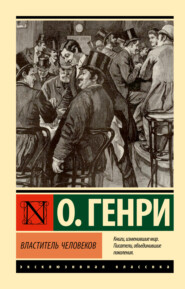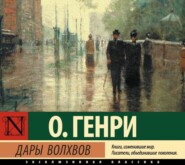По всем вопросам обращайтесь на: info@litportal.ru
(©) 2003-2025.
✖
Heart of the West [Annotated]
Настройки чтения
Размер шрифта
Высота строк
Поля
72
Quintana Creek is a tributary of the Nueces River in LaSalle County, where O. Henry spent two years on ranches.
73
tienda– (Spanish) store
74
lavendera– (Spanish) laundress, washerwoman
75
El Chivato– (Spanish) literally translated as The Sneak or The Informer but more likely meaning The Villain or The Evil One. This was one of the nicknames of Billy the Kid.
76
frijoles– (Spanish) beans, usually cooked a long time until very soft, with various seasonings added
77
Que mal muchacho!– (Spanish) What a bad boy!
78
alma– (Spanish) soul, spirit; in this sense a "soul-mate"
79
chica– (Spanish) girl, little one
80
caballo– (Spanish) horse
81
muy caballero– (Spanish) very much a gentleman
82
canciones de amor– (Spanish) love songs
83
pantalones and camisa– (Spanish) trousers and shirt
84
Pues– (Spanish) Well then
85
Valgame Dios!– (Spanish) God help me!
86
rift.. loot– Tennyson, Idylls of the King: Merlin and Vivien:
"It is the little rift within the lute
That by and by will make the music mute,
And ever widening slowly silence all."
87
spavined crowbait– a lame, emaciated horse (from spavin, an inflammation of the tarsal or ankle joint of a horse, causing lameness, and an appearance that causes carrion birds to think a meal is in the offing)
88
apples of silver—Proverbs XXV: "A word fitly spoken is like apples of gold in pictures of silver."
89
apples of the Hesperides– the eleventh labor of Hercules was to retrieve the golden apples of Zeus, which were guarded by a hundred-headed dragon and by the Hesperides, daughters of Atlas
90
Percival De Lacey– possibly derived from Maurice De Bracy in Sir Walter Scott's Ivanhoe
91
blind-bridle– a bridle with flap-like extensions partly covering the horse's eyes to prevent him from looking to the side or turning his head to the side
92
star wayno– probably a corruption of "esta bueno" ("that's good)
93
orchestrion– a large mechanical instrument capable of imitating various musical instruments or even an entire orchestra. It usually included components of an organ, piano, and percussion instruments. Those made by the Seeburg Company were also called nickelodeons because they played when a coin was inserted into a slot. The Seeburg Company later made "juke boxes."
94
O. Henry was not fond of national bank examiners. One (F. B. Gray) accused him of embezzling funds from the First National Bank of Austin, where he worked as a teller. The owners of the bank wanted to let the matter drop, possibly because some of them were guilty, but the examiner persisted. O. Henry (then William Sidney Porter) was convicted and spent three years in prison. To this day no one knows whether he was really guilty; he often claimed he took the blame for what others had done, but occasionally he made comments that might be construed as admissions of guilt.
Prison was good for O. Henry in one respect: it gave him the opportunity to write. At least a dozen of his stories were published (under various pen names) before his release in 1901, including "Georgia's Ruling," which, to this annotator, is one of his three best stories.
95
Quintana Creek is a tributary of the Nueces River in LaSalle County, where O. Henry spent two years on ranches.
73
tienda– (Spanish) store
74
lavendera– (Spanish) laundress, washerwoman
75
El Chivato– (Spanish) literally translated as The Sneak or The Informer but more likely meaning The Villain or The Evil One. This was one of the nicknames of Billy the Kid.
76
frijoles– (Spanish) beans, usually cooked a long time until very soft, with various seasonings added
77
Que mal muchacho!– (Spanish) What a bad boy!
78
alma– (Spanish) soul, spirit; in this sense a "soul-mate"
79
chica– (Spanish) girl, little one
80
caballo– (Spanish) horse
81
muy caballero– (Spanish) very much a gentleman
82
canciones de amor– (Spanish) love songs
83
pantalones and camisa– (Spanish) trousers and shirt
84
Pues– (Spanish) Well then
85
Valgame Dios!– (Spanish) God help me!
86
rift.. loot– Tennyson, Idylls of the King: Merlin and Vivien:
"It is the little rift within the lute
That by and by will make the music mute,
And ever widening slowly silence all."
87
spavined crowbait– a lame, emaciated horse (from spavin, an inflammation of the tarsal or ankle joint of a horse, causing lameness, and an appearance that causes carrion birds to think a meal is in the offing)
88
apples of silver—Proverbs XXV: "A word fitly spoken is like apples of gold in pictures of silver."
89
apples of the Hesperides– the eleventh labor of Hercules was to retrieve the golden apples of Zeus, which were guarded by a hundred-headed dragon and by the Hesperides, daughters of Atlas
90
Percival De Lacey– possibly derived from Maurice De Bracy in Sir Walter Scott's Ivanhoe
91
blind-bridle– a bridle with flap-like extensions partly covering the horse's eyes to prevent him from looking to the side or turning his head to the side
92
star wayno– probably a corruption of "esta bueno" ("that's good)
93
orchestrion– a large mechanical instrument capable of imitating various musical instruments or even an entire orchestra. It usually included components of an organ, piano, and percussion instruments. Those made by the Seeburg Company were also called nickelodeons because they played when a coin was inserted into a slot. The Seeburg Company later made "juke boxes."
94
O. Henry was not fond of national bank examiners. One (F. B. Gray) accused him of embezzling funds from the First National Bank of Austin, where he worked as a teller. The owners of the bank wanted to let the matter drop, possibly because some of them were guilty, but the examiner persisted. O. Henry (then William Sidney Porter) was convicted and spent three years in prison. To this day no one knows whether he was really guilty; he often claimed he took the blame for what others had done, but occasionally he made comments that might be construed as admissions of guilt.
Prison was good for O. Henry in one respect: it gave him the opportunity to write. At least a dozen of his stories were published (under various pen names) before his release in 1901, including "Georgia's Ruling," which, to this annotator, is one of his three best stories.
95

















